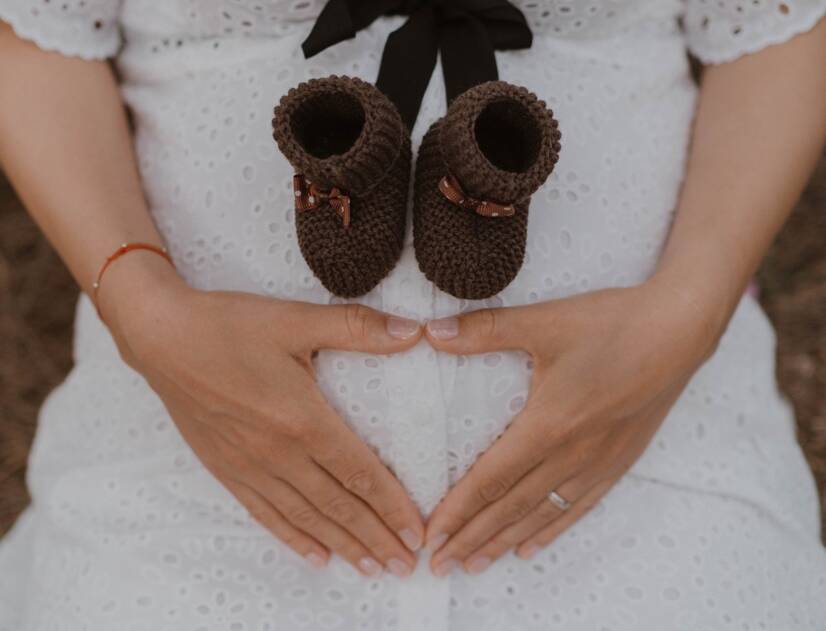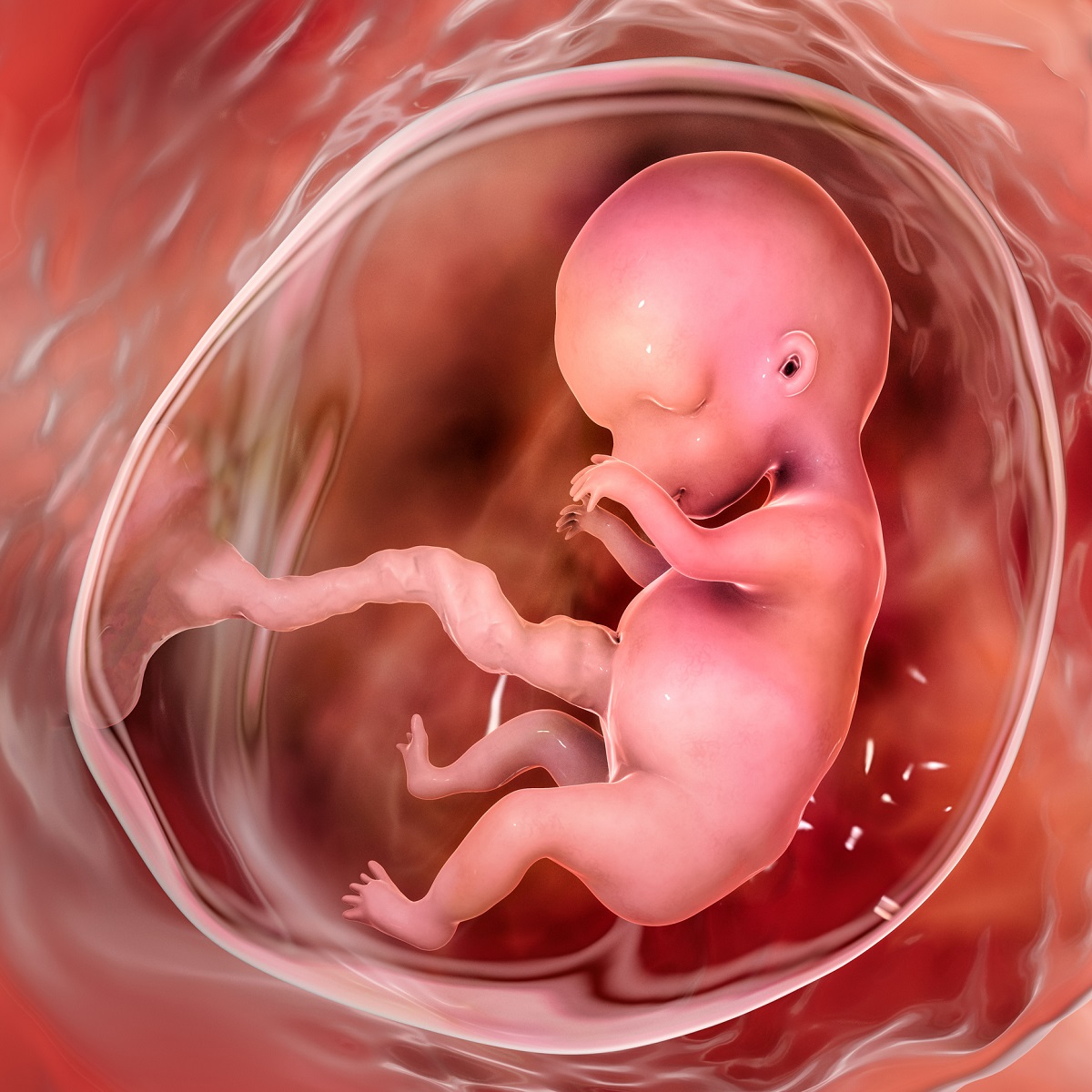- Pregnancy and childcare: Jane Symons
- General Kinesiology: Dylevský Ivan
- verywellfamily.com - Week 9 of Your Pregnancy
- whattoexpect.com - 9 Weeks Pregnant
- nhs.uk - Week-by-week quide to pregnancy
- pregnancybirthbaby.org - Pregnancy at week 9
- healthline.com - 9 Weeks Pregnant: Symptoms, Tips, and More
- medicalnewstoday.com - Your pregnancy at 9 weeks
- clevelandclinic.org - Hyperemesis Gravidarum (Severe Nausea & Vomiting During Pregnancy)
Week 9 of pregnancy: which organs are already functioning in the embryo?

In the 9th week of pregnancy, the pregnancy hormone HCG is at its peak. This causes the strongest symptoms in the form of morning sickness, mood changes, heartburn and fatigue.
Article content
It's been 7 weeks since fertilization and 9 weeks since your last period.
It may not appear to the outside world that you're pregnant, but you'll know it very well due to the peak of your symptoms.
Your baby is developmentally still an embryo, but in a week's time it will be a foetus.
How is your baby developing in your tummy?
Your baby is growing fast and becoming more like a baby every day.
The size of the embryo at 9 weeks of pregnancy is about 2.3 to 3.0 cm. Its weight is slowly increasing, now weighing about 1.5 to 2 g.
You can read more about fetal size in the article:
Ultrasound in pregnancy: fetal size, what is fetal biometry?
Its head is straightening, rounding and shaping more. From now on, the growth of the head will slow down and the growth of the body will continue.
Ears, eyes, nose, mouth and tongue are already visible on the embryo's face.
The face is forming and the nose is already visible with the nostrils.
The eyes are still developing. The eyelids slowly begin to cover the eyes to protect them.
The earlobes are already visible.

Organs and body systems continue to develop.
The pancreas, liver and bile ducts begin to develop.
The brain is improving and already giving signals to the organs to function.
The stomach begins to produce stomach acid.
The liver and kidneys begin to work. The kidneys are already producing urine and the liver blood cells.
The intestines slowly begin to move from the umbilical cord portion of the embryo into the abdominal cavity as it grows.
The tail at the end of the spine slowly disappears completely.
The baby has been lying in the amniotic sac in the characteristic position with the back curved. From this week onwards, it is beginning to straighten up.
Small muscles are beginning to form.
His fingers and toes are becoming more noticeable.
His arms are already bending at the elbows.
The heart and circulatory system continue to develop and improve. The heart is constantly working and beating at a rate of 140-150 beats per minute.
The rib bones are forming and slowly stiffening.
Blood vessels are forming under the skin.
The baby moves its legs, does somersaults, moves its fingers and puts its thumb in a gripping position. The lower limbs are characterized by kicking movements.
How does a woman feel in the 9th week of pregnancy?
The pregnancy hormone HCG is at its peak. This can cause unpleasant symptoms such as nausea, which are most intense during this period.
Clothes in your abdominal area are getting tighter.
Your weight has already slowly increased.
For each pregnant woman, gaining weight in pregnancy is individual. Some women have already gained a few kilograms, others are holding their weight. Those who suffer from severe nausea and vomiting have probably lost weight from their previous weight.
How much weight to gain during pregnancy, you can read in our article:
How much to gain during pregnancy? What does it depend on and what to watch out for?
Nausea peaks in this week. If you suffer from extreme nausea and vomiting, it may be a sign of hyperemesis gravidarum.
What is hyperemesis gravidarum?
It is the medical name for a severe and severe form of nausea and vomiting in pregnancy.
This severe nausea is caused by rapidly rising levels of HCG (human chorionic gonadotropin) and estrogen hormone in the blood. It is more common in multiple pregnancies during the first trimester of pregnancy.
It is manifested by frequent vomiting, more than four times a day, weight loss, dizziness, even dehydration of the organism.
If you suffer from such symptoms, inform your gynaecologist about it. The doctor will prescribe medication to relieve nausea.
Vitamin B6 is recommended, eat small amounts of food and more often, eating biscuits is also advisable.
The medication prescribed by the gynaecologist is most often in the form of a suppository, as the woman is unable to take anything by mouth. The last option is to be admitted to hospital and given fluids and nutrients in the form of infusions.

Mood swings are strongest between the 6th and 10th week of pregnancy. They are caused by fluctuations in hormones.
Heartburn can be caused by the hormone progesterone, which relaxes the smooth muscles and slows digestion. The upper sphincter of the stomach is composed of smooth muscle. It relaxes and food can back up into the oesophagus, causing heartburn.
If you have heartburn, eat small portions of food and more often. Chew your food well and eat slowly.
Skin changes. Your skin may produce more sebum and start to form rashes. In turn, it may become more dry and lead to a feeling of dry skin.
Fatigue is very common in the first trimester, sometimes showing up as extreme tiredness. Your body is working overtime to create the placenta and is also going through hormonal changes.
Poor quality sleep and frequent waking to urinate at night also contribute to fatigue.
But don't worry, as you move into the second trimester, these symptoms such as morning sickness, extreme fatigue and frequent urination will ease. The placenta will already be fully formed and will take over the role of nourishing the fetus.
Frequent urination is caused by the enlarging uterus due to its pressure on the bladder. It may also be due to pregnancy hormones, which make your womb more engorged.
Feeling of fullness and itchy breasts. Your breasts are growing and the skin on them is stretching, which can cause itchy breasts. Use unscented moisturizing creams to relieve this uncomfortable feeling.
Sex in pregnancy is safe. The baby is protected by the amniotic fluid and the uterus by the mucus plug on the cervix.
Headaches can arise from hormonal changes, but also from increased blood volume, lack of sleep, low blood sugar, poor posture and caffeine withdrawal.
If migraines start to occur, try to get enough sleep, ensure adequate exercise, avoid stress, eat a healthy diet, increase fluid intake. When a headache starts, put cold compresses on your head.
If vomiting, visual disturbances, pain under the ribs, abdominal pain, high blood pressure and swelling occur with the headache, visit the nearest hospital. These may be signs of pre-eclampsia.
Other common symptoms are feeling bloated and increased flatulence.
Constipation is caused by hormones that relax and slow down intestinal peristalsis. Persistent constipation and stool pressure can make you experience uncomfortable hemorrhoids.
You can read more about hemorrhoids in the article:
Hemorrhoidsin pregnancy and after childbirth: Why do they occur, how to treat them?
Metallic taste or aftertaste in the mouth is manifested in some pregnant women.
Increased salivation is common in pregnancy, especially in the 1st trimester.
Dizziness and feeling faint are caused by pregnancy hormones, blood sugar fluctuations and low blood pressure.
Increased hunger. Some pregnant women experience an increased feeling of hunger due to pregnancy changes. After eating, they do not feel full and need to eat more.
There may also be new cravings for food that you didn't have before, and cravings for different combinations of foods that are sometimes almost incomprehensible. Conversely, some people develop food aversion again with a feeling of nausea. Combinations of increased appetite and, conversely, food aversion are also common.
Increased sense of smell is caused by an increase in pregnancy hormones, but it may not occur in every pregnant woman. Some pregnant women are also bothered by smells that they have smelled before. For example, the smell of coffee, cooked meat, perfume. Smells or odours may cause nausea or vomiting.
A milky vaginal discharge is normal.
Read more about discharge in pregnancy in our article:
Discharge in pregnancy. What is considered normal discharge? And how does an infection manifest itself?
There may be cramps in the lower abdomen similar to menstrual pain caused by the growth of the uterus. They are quite common if they occur without other symptoms.
The cramps may be accompanied by other symptoms, such as vaginal bleeding with a pinkish discharge. Alternatively, the cramps may come at regular intervals and be intense. In this case, see your gynaecologist or hospital immediately. They will check that everything is progressing as it should and that the pregnancy is not in danger.
Darkening of the skin, dark spots on the skin and darkening of the nipples are common symptoms.
Your hair may boast a thicker and shinier appearance.
Watch out for urinary tract infections and yeast infections, to which you are more susceptible during pregnancy.
If you're unsure about something or something doesn't feel right, call your gynaecologist and consult with him.
If you experience symptoms such as:
- Vaginal bleeding or cramps
- Odor of vaginal discharge
- Fever
- Chills
- Pain and burning during urination
- Rapid heartbeat
- Extreme vomiting and nausea
Tell your gynecologist or visit the nearest hospital. It may be a miscarriage in progress, an infection, or another symptom threatening your pregnancy.
Seeing a gynaecologist at 9 weeks of pregnancy
A visit to the pregnancy clinic is made every four weeks in the 1st and 2nd trimesters.
Between the 8th and 10th week of pregnancy, you will have blood draws for an initial examination, to determine your blood type and Rh factor.
At each clinic you will have your weight and blood pressure measured, your urine will be tested for protein in the urine and you will have a gynaecological examination.
An ultrasound scan is performed between 9 and 11 weeks, when the size of the embryo is determined by the distance from the vertex to the coccyx - the CRL. The embryo's activity, heartbeat, placenta placement in the uterus and overall development are monitored.
The main ultrasound examination in the first trimester is performed between the 11th and 14th week of pregnancy.
What we recommend and what to look out for
- Avoid negative influences that could compromise fetal development, such as radiation, chemicals, medications.
- Eat a healthy diet with plenty of fruit and vegetables.
- Supplement your diet with prenatal vitamins and folic acid.
- Supplement fibre to prevent constipation.
- Follow a drinking regime of at least 2-3 litres of fluids.
- Avoid junk foods, fatty, fried, spices. They can give you indigestion, heartburn and nausea.
- Do not consume undercooked meat, fish, eggs or unpasteurized milk.
- Wear loose clothing that does not tighten too much in the abdomen.
- Wear a comfortable bra. A sports or maternity bra may also help.
- For sensitive and painful breasts, try cold compresses or showering with warm water, but not hot water.
- Try to keep yourself emotionally calm.
- If you are a smoker, try to stop smoking.
Nicotine products increase the risk of problems in pregnancy. These include miscarriage, placental problems, starting premature labor, low birth weight, sudden infant death syndrome, and can even cause heart defects, cleft lip, and more.
Read also interesting articles:
- How long does pregnancy last? How many days, weeks and months?
- When does it form, what does it look like, how does it go away?
- Stretch marks in pregnancy not only on the abdomen? Do you know when they form?
- In pregnancy, watch out for anemia. What causes it, symptoms?
- Head spinning in pregnancy: at the beginning and as a symptom, what else does it indicate?
- Protein in the urine during pregnancy? May or may not be a problem
- With folic acid to the longed-for baby and healthy blood vessels?
- Are you pregnant and suffering from lower abdominal pain?
You can read more about fetal development in our article:
Pregnancyby weeks.
Gallery


Interesting resources
Related










